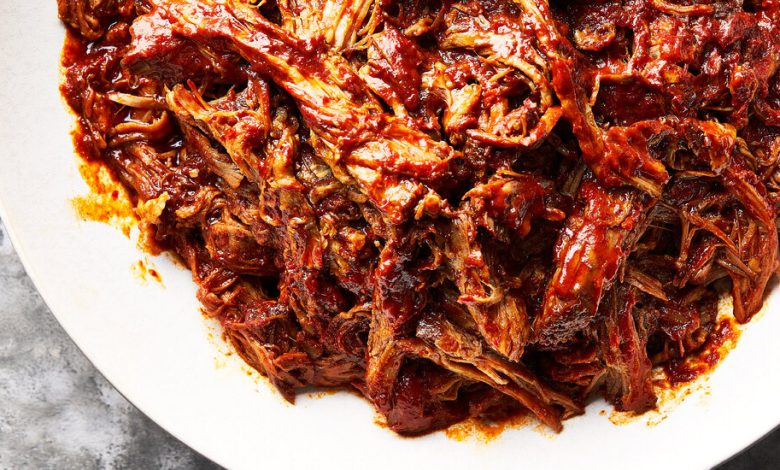Pulled Pork Is Easier Than You Think

Inside the white brick walls of Rodney Scott’s Whole Hog BBQ in Charleston, S.C., past the bright dining room, is the pit room, the walls, floors and equipment shades of copper and black. There, pork slowly barbecues over hardwood that has been burned into coals, prepared with the craft that Mr. Scott, a chef and a founder of the restaurant, learned from his family.
The meaty smoke was as heavy as a wool blanket and smelled so good, I wanted to gather a handful of air and eat it. Watching the cooks kindle the embers, mop racks of ribs with sauce and turn enormous sides of meat, it quickly became clear that true whole hog barbecue is best left to pitmasters.
The rest of us may not be able to capture the woodsy nuances of pit-smoked pork, but anyone can prepare and share the joy that is pulled pork. Spice-rubbed pork shoulder cooked slowly with low heat sweetens naturally and eventually falls apart with a gentle nudge. It takes time for the meat to soften, but the energy and hours you put in can range widely.
A slow cooker makes for the easiest preparation, and a pressure cooker turns out the fastest version, but for anyone lured by fire — with whole day to spare — a backyard charcoal grill version of pit cooking is within reach. It takes 14 hours or so, and the tending required can be relaxing or stressful, depending on, well, you.
But if you don’t have a day to dedicate to smoking meat — or, let’s be honest, the desire — you can easily replicate the taste without the commitment.
What’s amazing about wood smoke is that it infuses raw meat right away, so letting it swirl around a fat-marbled shoulder for even an hour gives pork a halo of that unmistakable barbecue scent. This is my preferred method, especially for parties. Set up a charcoal grill for indirect grilling, then push the glowing coals to one side before putting the pork on the other. Toss fragrant wood chips and chunks over the coals, and quickly close the lid, sliding the vents open a sliver.
After an hour or two, you can transfer the pork to a Dutch oven and pour in a half-inch of water, stock, soda or cider, slipping in onions or garlic if you like. Once you cover the pot and put it in the oven, you can leave it alone until the pork collapses.
You also can skip outdoor smoking altogether and leave the pork in the oven from start to finish. An initial blast of dry high heat caramelizes it before low heat tenderizes the meat. You can ignore the pork during those hours of slow baking, then return to it for a quick run under the broiler at the end. That will give the meat a little smokiness and create crispy bits.
The Southern dish “pulled pork” is often doused with barbecue sauce. But I see its tender shredded meat as an opportunity to experiment with seasonings and other sauces. Lately, I’ve enjoyed hot ground chile in the rub and mild dried chiles in the braising liquid, which I blend into sauce. This preparation is as inspired by pulled pork as it is by carne con chile rojo, and it works just as well between buns as it does wrapped in tortillas.
The natural sweetness of pork shoulder means it can take on a variety of flavors, so you’ll always end up with a dish everyone loves. That it can take as little as half an hour of your attention or become a leisurely day cooking outside is just another reason to make it anytime you want.
Recipe: Pulled Pork
Follow New York Times Cooking on Instagram, Facebook, YouTube, TikTok and Pinterest. Get regular updates from New York Times Cooking, with recipe suggestions, cooking tips and shopping advice.
